新概念英语第二册Lesson 4 An exciting trip?课件(共52张PPT)
文档属性
| 名称 | 新概念英语第二册Lesson 4 An exciting trip?课件(共52张PPT) | 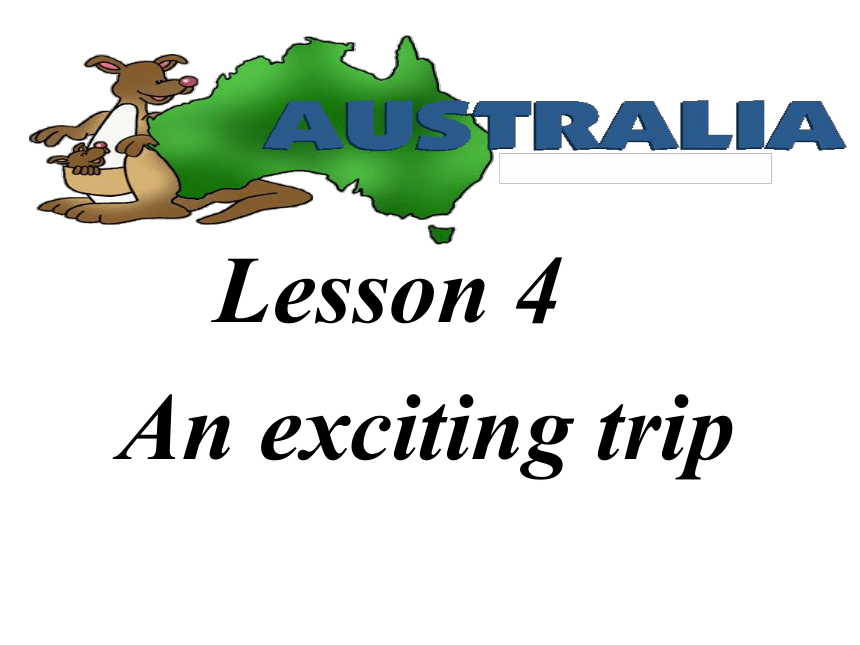 | |
| 格式 | ppt | ||
| 文件大小 | 3.4MB | ||
| 资源类型 | 教案 | ||
| 版本资源 | 新概念英语 | ||
| 科目 | 英语 | ||
| 更新时间 | 2023-10-06 07:38:42 | ||
图片预览


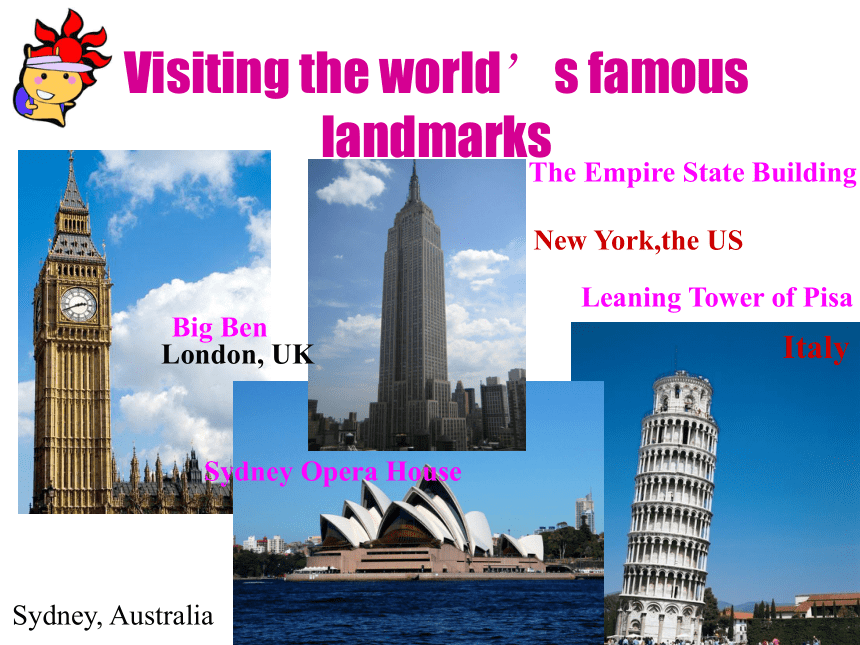
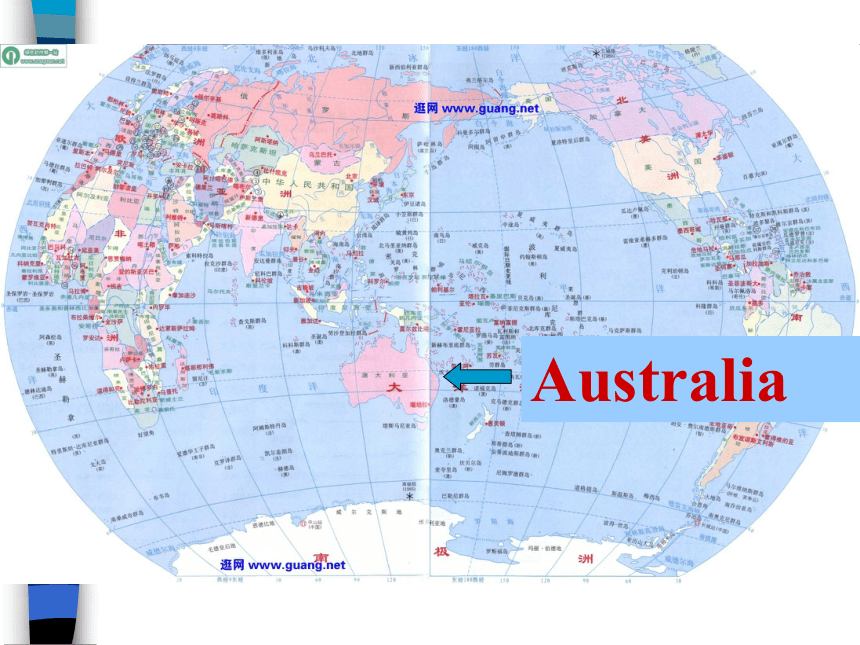
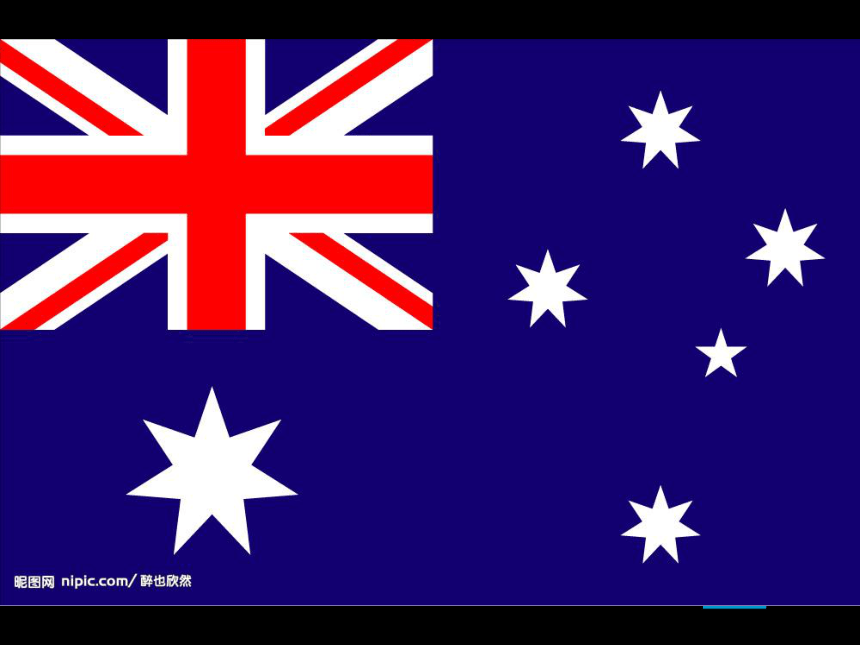
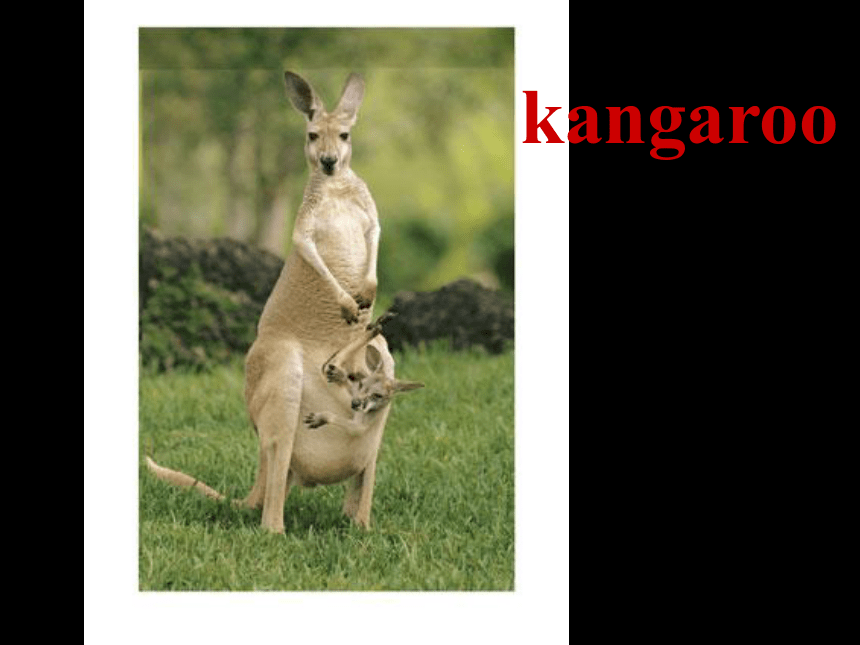
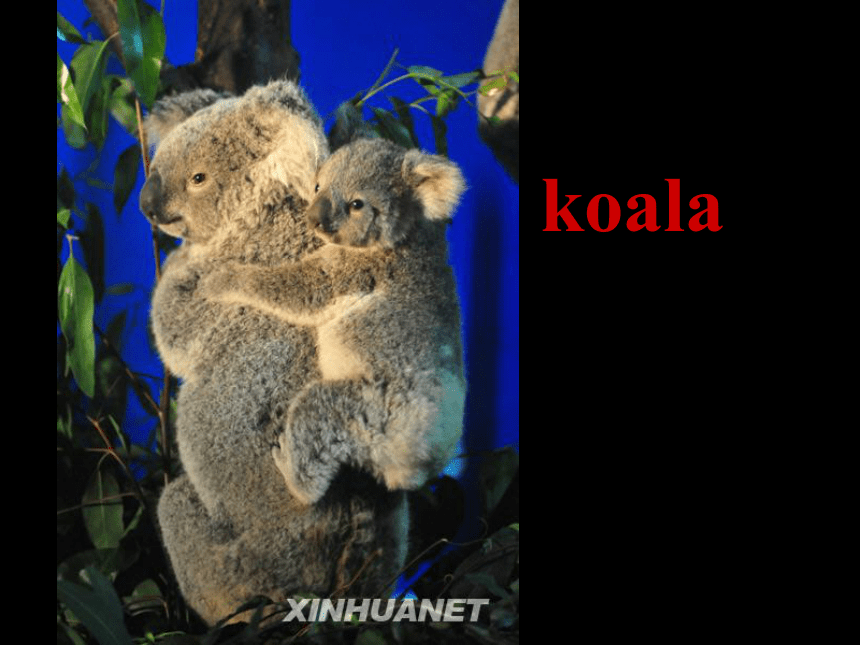

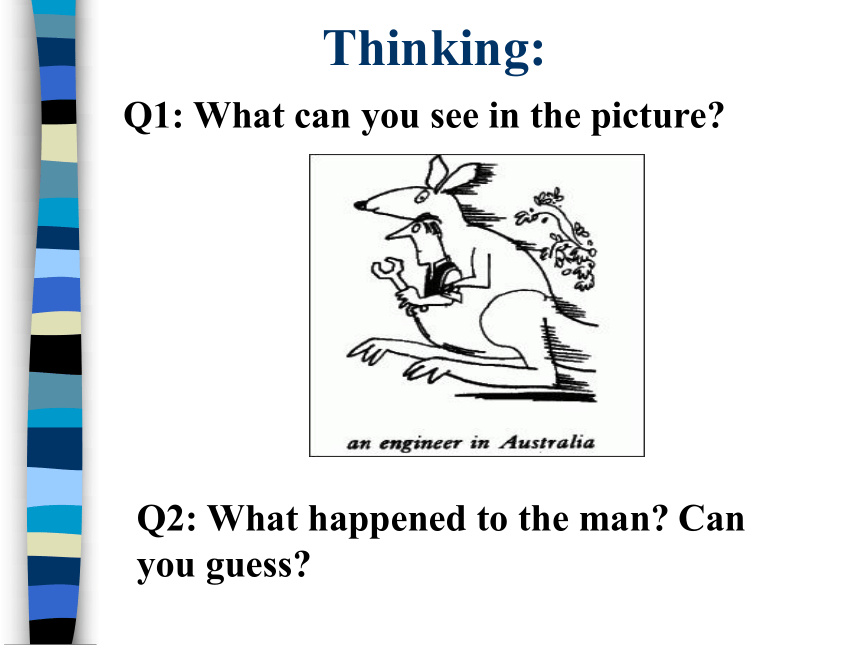
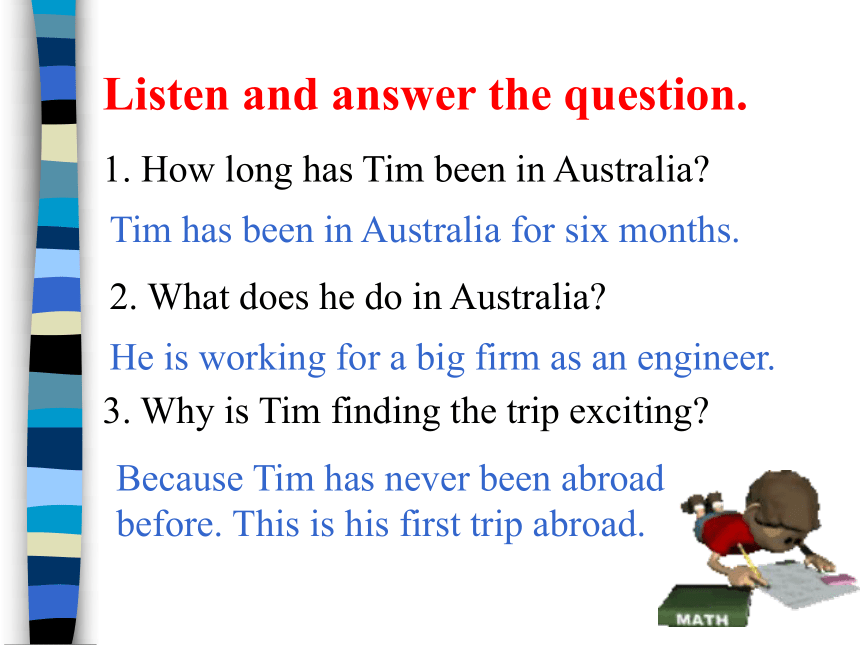
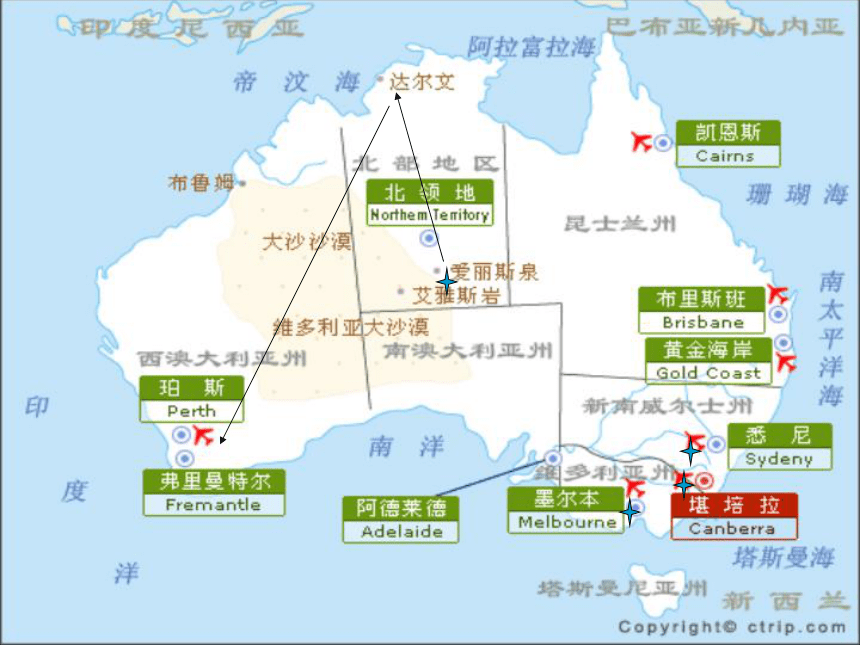
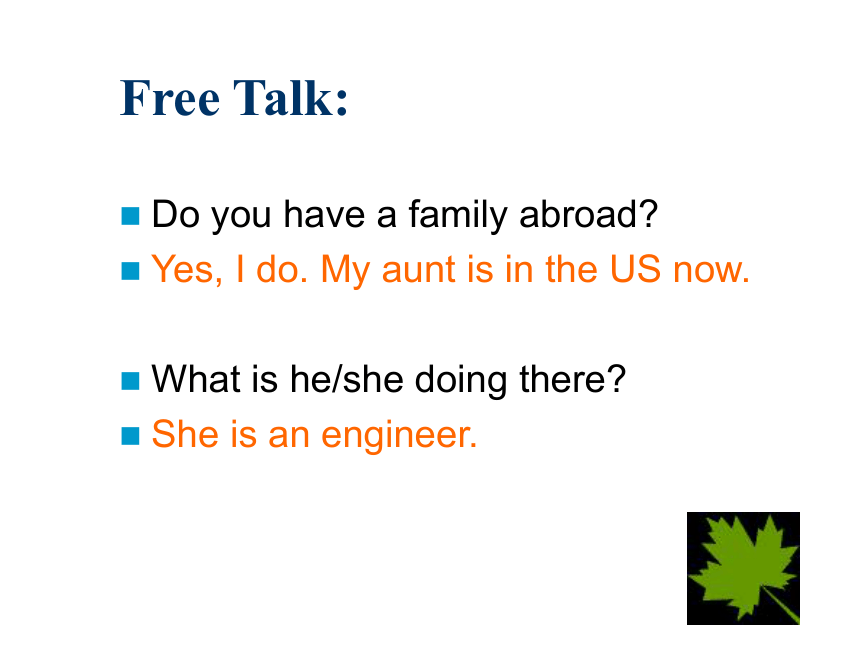
文档简介
(共52张PPT)
Lesson 4
An exciting trip
1. Do you like traveling
2. Where would you like to travel
Visiting the world’s famous landmarks
Leaning Tower of Pisa
The Empire State Building
Sydney Opera House
Big Ben
Sydney, Australia
London, UK
New York,the US
Italy
Australia
kangaroo
koala
Sydney Opera House
Q1: What can you see in the picture
Thinking:
Q2: What happened to the man Can you guess
1. How long has Tim been in Australia
Listen and answer the question.
Tim has been in Australia for six months.
2. What does he do in Australia
He is working for a big firm as an engineer.
3. Why is Tim finding the trip exciting
Because Tim has never been abroad before. This is his first trip abroad.
Free Talk:
Do you have a family abroad
Yes, I do. My aunt is in the US now.
What is he/she doing there
She is an engineer.
kangaroo
Sydney Opera House
koala
exciting
adj. 令人兴奋的
excited 感到兴奋的
-ed自己感到 interested, bored,
-ing令人感到interesting,boring,
e.g. I am interested in this book.
This is an interesting book.
words & phrases
words & phrases
receive
1.接受,收到,接受
她收到了一份礼物。
She received a present.
2.接待,接见
总统接见了客人。
The President received the guests.
v.接受,收到(客观的收到)
e.g. receive a letter (from sb.)
This morning I receive a bunch of flowers.
同义 accept同意,接受(主观)
e.g. This morning I received a bunch of flowers but I didn’t accept it.
receive
words & phrases
firm
1.n. 公司,商号
他在一家工程公司工作。
He works for an engineer firm.
2.adj. 结实的,稳固的
这部小汽车非常坚固。
The car is very firm.
different adj. 不同的
deference n. 不同,差别,差异
be different from...与…不同
我的观点与你的不同。
My opinion is different from yours.
center n. 中心,中央 v. 集中,使聚集在一点
尽管伦敦市英国的首都,但是它并不在
这个国家的中心。
Although London is Britain’s capital, it is not at the center of the country.
他的兴趣都以学习为中心。
His interests are centered round his family.
abroad adv. 往国外,到处,海外,广泛
go abroad 去国外
live abroad 到国外定居
study abroad 到国外学习
他在国外生活了许多年。
He lived abroad for many years.
你出国度假吗?
Are you going abroad for your holidays
Language points
1. I have just received a letter from my brother.
收到某人来信
2.He is working for a big firm.
get a letter from sb.
have a letter from sb.
hear from sb.
在…上班、任职,还可以用work at/in
e.g.My father works for a company.
3. he has already visited a great number of different places in Australia.
a number of+可数名词的复数,number前一般可用large, great, small等形容词强调数量大小。
a great many of + 可数名词
A great number of students are fond of music.
A great number of boys like playing basketball.
Language points
4. He has just bought an Australian car and has
gone to Alice springs.
He has gone to the south.(还在)
He has been to the south.(去过)
5. He is finding this trip very exciting.
find+n+adj.觉得…怎么样
我觉得这部电影很令人失望。
你觉得这本书非常有趣吗?
e.g.I find the film disppointing.
Do you find the book very interesting
I have just _________ a letter_____my brother, Tim. He is in Australia. He has _____ there for six months. Tim is an engineer. He is working ____a big firm and he has already ______a great number of different places in Australia. He has just ______an Australian car and has _____to Alice Springs, a small town in the centre of Australia. He will soon visit Darwin. From there, he will fly to Perth. My brother has never _____ abroad before, so he is finding this trip very exciting.
received
from
been
for
visited
bought
gone
been
Listening:True or false
I have just received a letter from my sister, Tim.
False. I have just received a letter from my brother, Tim.
2. He has been there for three months.
False. He has been there for six months.
3. Tim is a mechanic. He is working for a small firm.
False. Tim is an engineer. He is working for a big firm.
4. He has already visited a great number of different places in Australia.
True.
True or false
5. He has just bought an American car .
False. He has just bought an Australian car.
6. He has gone to Alice Springs , a small town in the south of Australia.
False. He has gone to Alice Springs , a small town in the centre of Australia.
7. He will soon visit Perth, and then fly to Darwin.
False. He will soon visit Darwin, and then fly to Perth.
8. My brother has never been abroad there, so he is finding this trip very exciting.
True.
Lesson 4 An exciting trip
I have just received a letter from my brother, Tim. He is in Australia. He has been there for six months. Tim is an engineer. He is working for a big firm and he has already visited a great number of different places in Australia. He has just bought an Australian car and has gone to Alice Springs, a small town in the centre of Australia. He will soon visit Darwin. From there, he will fly to Perth. My brother has never been abroad before, so he is finding this trip very exciting.
Summary writing
Answer these questions in not more than 50 words.
What has the writer just received from his brother
2. Is Tim an engineer, or is he a doctor
3. How long has he been in Australia
4. Has he already visited many places or not
5. Where is he now
6. Has Tim ever been abroad before or not
7. Is he enjoying his trip very much or not
Summary writing
The writer has just received a letter from his brother, Tim. Tim is an engineer. He has been in Australia for six months. He has just already visited many places. Now he is in Alice springs. Tim has never been abroad before. He is enjoying his trip very much.
The present perfect tense
现在完成时
我住在北京。
我曾经住在北京。
我一直住在北京。
I live in Beijing.
I lived in Beijing.
I have lived in Beijing.
现在完成时的构成形式
have
has(单数第三人称)
助动词
过去分词
Grammar
come-came-come
go-went-gone
get-got-got
think-thought-thought
+
现在完成时态
Winter
has already come.
Grammar: the present perfect tense.
Have/has+过去分词
用来表示之前已经发生或完成的动作或状态,而其结果却和现在有联系: 动作或状态发生在过去,但它的影响现在还存在。
They have left.
--他们已经离开了,也就是说现在他们人不在这里
I have had my lunch.
--我已经吃过午饭了,也就是说我现在不饿
现在完成时的含义
也可表示持续到现在的动作或状态。
He has learned English since 2001.
--从2001年开始学的,现在还在继续学着呢
3现在完成时可表示持续到现在的动作或状态,动词一般是延续性的,如live,teach,learn,work,study, know. 一般过去时常用的非持续性动词有come, go, leave, start, die, finish, become, get married等。
She joined the League three years ago.
(加入的动作不是延续的)
She has been in the League for three years (since three years ago).(在团内的状态可延续)
She has been a League member for three years (since three years ago).(是团员的状态可持续)
Grammar
now
past
future
一般过去时
一般过去时表示的是纯粹在过去发生的事情
现在完成时表示的是在过去某个时间开始并持续到现在的动作/状态,或者发生在过去却对现在造成的影响
Grammar
现在完成时与一般过去时的比较
1)一般过去时表示过去某时发生的动作或单纯叙述过去的事情,强调动作;
现在完成时为过去发生的,强调过去的事情对现在的影响,强调的是影响。
I saw this film yesterday.
强调看的动作发生过了。
I have seen this film. 强调对现在的影响,电影的内容已经知道了。
2一般过去时常与具体的表示过去的时间状语连用;
现在完成时通常与模糊时间状语连用或无时间状语。
一般过去时的时间状语: yesterday, last week,…ago, in1990, in October, just now, …-- 具体的时间状语 现在完成时的时间状语: for, since, so far, ever, never, just, yet, till/until, up to now, in the past few years, recently, … --模糊的时间状语
句子中如有过去时的时间副词(如 yesterday, last, week, in 1960)时,不能使用现在完成时,要用过去时
错Tom has written a letter to his parents last night.
对Tom wrote a letter to his parents last night.
Grammar
延续动词表示经验、经历;
瞬间动词表示行为的结果,不能与表示一段
时间的状语连用。
比较延续动词与瞬间动词
He has finished the work.他已完成了那项工作。 (表结果) I’ve known him since then.我从那时起就认识他了。(表经历)
Grammar
since 用来说明动作起始时间— “自从……”
for用来说明动作延续时间长度— “长达……”
I have lived here for more than twenty years. I have lived here since I was born. My aunt has worked in a company since 1949. I have not heard from my uncle for a long time.
比较since和for
并非有for 作为时间状语的句子都用现在完成时
I worked here for more than twenty years. (我现在已不在这里工作。)
I have worked here for many years. (现在我仍在这里工作。)
Grammar
He has gone to Shanghai.
他(已经)去上海了。
He has been to Shanghai.
他(曾经) 去过上海。
比较 have/has been to , have/has gone to
Grammar
sum up
1.过去发生的动作对现在的影响或产生的结果。常与表示时间的副词连用,如yet, just, before, recently, ever, never等。
e.g. We have just won the match.
I have never been to Australia before.
一、现在完成时
sum up
1.表示从过去开始延续到现在的动作或状态,常与表示一段时间的时间状态连用,如so far, up till now, since, for a long time, in the past few years, those days等。
e.g. So far, he has broken two world records.
I have worked here for four years.
一、现在完成时
sum up
3.短暂性动词在现在完成时中不能与表示一段时间的状语连用,常见的动词有die, arrive, leave, go, refuse, finish, marry, buy等。
e.g. His grandfather has died for three years.
His grandfather has been dead for three years.
I have bought the car for half a year.
I have got the car for half a year.
一、现在完成时
sum up
一、现在完成时
肯定句:主语+have/has+过去分词+其它
否定句:主语+have/has not+过去分词+其它
疑问句:Have/Has+主语+过去分词+其它
He has been to Australia.
He has not been to Australia.
Has he been to Australia
--Will you go shopping with me now
--Sorry, I can’t. I _____ my shirts.
A wash B have washed
C washed D am washing
How long have you ______ the magazine
About a week.
A found B borrowed C received D had
____ you _____ the film Harry Potter 5
Not yet. I will see it this Sunday.
A Did, see B Are, seeing
C Have, seen D Do, see
How is Ann I ____ her for a long time.
A don’t see B won’t see
C didn’t see D haven’t seen
Hasn’t Betty come yet
No, and I ____ for her for nearly 2 hours.
A wait B waited C have waited D had waited
Is Mr Baker at home
Sorry, he isn’t in. He ____ to Dalian for vacation.
A has gone B went C is going D goes
Mr. Zhang is a teacher of rich experience. He ___ English for 20 years.
A has taught B will teach
C teaches D taught
--How many times have you ____ to Xi’an
--Three times.
A been B went C gone D go
I won’t forget my teacher because she ____ so kind to me since I came to this school.
A has been B will be C was D is
He _____ our school for two weeks.
A left B has left C has been away from
-- My father ____Shanghai with my grandparents.
--Really ____ will they come back
A has been to, How soon B has gone to, How soon C has been to , How long D has gone to, How long
She ___ that same song so many times. I’m getting sick of it!
A sings B sang C will sing D has sung
--Mike, you ___ the magazine since last week. Can you return it now
--Sure.
A borrowed B have borrowed C have kept
Retell the text according to the following words.
1. Just--- letter---bother---Tim
2. In Australia
3. There---six months
4. Tim---engineer
5. Big firm --- already--- number---places
6. Bought --- Australian car--- Alice Springs---small town ---centre
7. Soon ---Darwin
8. From there --- fly --- Perth
9. Never before --- trip --- exciting
Lesson 4
An exciting trip
1. Do you like traveling
2. Where would you like to travel
Visiting the world’s famous landmarks
Leaning Tower of Pisa
The Empire State Building
Sydney Opera House
Big Ben
Sydney, Australia
London, UK
New York,the US
Italy
Australia
kangaroo
koala
Sydney Opera House
Q1: What can you see in the picture
Thinking:
Q2: What happened to the man Can you guess
1. How long has Tim been in Australia
Listen and answer the question.
Tim has been in Australia for six months.
2. What does he do in Australia
He is working for a big firm as an engineer.
3. Why is Tim finding the trip exciting
Because Tim has never been abroad before. This is his first trip abroad.
Free Talk:
Do you have a family abroad
Yes, I do. My aunt is in the US now.
What is he/she doing there
She is an engineer.
kangaroo
Sydney Opera House
koala
exciting
adj. 令人兴奋的
excited 感到兴奋的
-ed自己感到 interested, bored,
-ing令人感到interesting,boring,
e.g. I am interested in this book.
This is an interesting book.
words & phrases
words & phrases
receive
1.接受,收到,接受
她收到了一份礼物。
She received a present.
2.接待,接见
总统接见了客人。
The President received the guests.
v.接受,收到(客观的收到)
e.g. receive a letter (from sb.)
This morning I receive a bunch of flowers.
同义 accept同意,接受(主观)
e.g. This morning I received a bunch of flowers but I didn’t accept it.
receive
words & phrases
firm
1.n. 公司,商号
他在一家工程公司工作。
He works for an engineer firm.
2.adj. 结实的,稳固的
这部小汽车非常坚固。
The car is very firm.
different adj. 不同的
deference n. 不同,差别,差异
be different from...与…不同
我的观点与你的不同。
My opinion is different from yours.
center n. 中心,中央 v. 集中,使聚集在一点
尽管伦敦市英国的首都,但是它并不在
这个国家的中心。
Although London is Britain’s capital, it is not at the center of the country.
他的兴趣都以学习为中心。
His interests are centered round his family.
abroad adv. 往国外,到处,海外,广泛
go abroad 去国外
live abroad 到国外定居
study abroad 到国外学习
他在国外生活了许多年。
He lived abroad for many years.
你出国度假吗?
Are you going abroad for your holidays
Language points
1. I have just received a letter from my brother.
收到某人来信
2.He is working for a big firm.
get a letter from sb.
have a letter from sb.
hear from sb.
在…上班、任职,还可以用work at/in
e.g.My father works for a company.
3. he has already visited a great number of different places in Australia.
a number of+可数名词的复数,number前一般可用large, great, small等形容词强调数量大小。
a great many of + 可数名词
A great number of students are fond of music.
A great number of boys like playing basketball.
Language points
4. He has just bought an Australian car and has
gone to Alice springs.
He has gone to the south.(还在)
He has been to the south.(去过)
5. He is finding this trip very exciting.
find+n+adj.觉得…怎么样
我觉得这部电影很令人失望。
你觉得这本书非常有趣吗?
e.g.I find the film disppointing.
Do you find the book very interesting
I have just _________ a letter_____my brother, Tim. He is in Australia. He has _____ there for six months. Tim is an engineer. He is working ____a big firm and he has already ______a great number of different places in Australia. He has just ______an Australian car and has _____to Alice Springs, a small town in the centre of Australia. He will soon visit Darwin. From there, he will fly to Perth. My brother has never _____ abroad before, so he is finding this trip very exciting.
received
from
been
for
visited
bought
gone
been
Listening:True or false
I have just received a letter from my sister, Tim.
False. I have just received a letter from my brother, Tim.
2. He has been there for three months.
False. He has been there for six months.
3. Tim is a mechanic. He is working for a small firm.
False. Tim is an engineer. He is working for a big firm.
4. He has already visited a great number of different places in Australia.
True.
True or false
5. He has just bought an American car .
False. He has just bought an Australian car.
6. He has gone to Alice Springs , a small town in the south of Australia.
False. He has gone to Alice Springs , a small town in the centre of Australia.
7. He will soon visit Perth, and then fly to Darwin.
False. He will soon visit Darwin, and then fly to Perth.
8. My brother has never been abroad there, so he is finding this trip very exciting.
True.
Lesson 4 An exciting trip
I have just received a letter from my brother, Tim. He is in Australia. He has been there for six months. Tim is an engineer. He is working for a big firm and he has already visited a great number of different places in Australia. He has just bought an Australian car and has gone to Alice Springs, a small town in the centre of Australia. He will soon visit Darwin. From there, he will fly to Perth. My brother has never been abroad before, so he is finding this trip very exciting.
Summary writing
Answer these questions in not more than 50 words.
What has the writer just received from his brother
2. Is Tim an engineer, or is he a doctor
3. How long has he been in Australia
4. Has he already visited many places or not
5. Where is he now
6. Has Tim ever been abroad before or not
7. Is he enjoying his trip very much or not
Summary writing
The writer has just received a letter from his brother, Tim. Tim is an engineer. He has been in Australia for six months. He has just already visited many places. Now he is in Alice springs. Tim has never been abroad before. He is enjoying his trip very much.
The present perfect tense
现在完成时
我住在北京。
我曾经住在北京。
我一直住在北京。
I live in Beijing.
I lived in Beijing.
I have lived in Beijing.
现在完成时的构成形式
have
has(单数第三人称)
助动词
过去分词
Grammar
come-came-come
go-went-gone
get-got-got
think-thought-thought
+
现在完成时态
Winter
has already come.
Grammar: the present perfect tense.
Have/has+过去分词
用来表示之前已经发生或完成的动作或状态,而其结果却和现在有联系: 动作或状态发生在过去,但它的影响现在还存在。
They have left.
--他们已经离开了,也就是说现在他们人不在这里
I have had my lunch.
--我已经吃过午饭了,也就是说我现在不饿
现在完成时的含义
也可表示持续到现在的动作或状态。
He has learned English since 2001.
--从2001年开始学的,现在还在继续学着呢
3现在完成时可表示持续到现在的动作或状态,动词一般是延续性的,如live,teach,learn,work,study, know. 一般过去时常用的非持续性动词有come, go, leave, start, die, finish, become, get married等。
She joined the League three years ago.
(加入的动作不是延续的)
She has been in the League for three years (since three years ago).(在团内的状态可延续)
She has been a League member for three years (since three years ago).(是团员的状态可持续)
Grammar
now
past
future
一般过去时
一般过去时表示的是纯粹在过去发生的事情
现在完成时表示的是在过去某个时间开始并持续到现在的动作/状态,或者发生在过去却对现在造成的影响
Grammar
现在完成时与一般过去时的比较
1)一般过去时表示过去某时发生的动作或单纯叙述过去的事情,强调动作;
现在完成时为过去发生的,强调过去的事情对现在的影响,强调的是影响。
I saw this film yesterday.
强调看的动作发生过了。
I have seen this film. 强调对现在的影响,电影的内容已经知道了。
2一般过去时常与具体的表示过去的时间状语连用;
现在完成时通常与模糊时间状语连用或无时间状语。
一般过去时的时间状语: yesterday, last week,…ago, in1990, in October, just now, …-- 具体的时间状语 现在完成时的时间状语: for, since, so far, ever, never, just, yet, till/until, up to now, in the past few years, recently, … --模糊的时间状语
句子中如有过去时的时间副词(如 yesterday, last, week, in 1960)时,不能使用现在完成时,要用过去时
错Tom has written a letter to his parents last night.
对Tom wrote a letter to his parents last night.
Grammar
延续动词表示经验、经历;
瞬间动词表示行为的结果,不能与表示一段
时间的状语连用。
比较延续动词与瞬间动词
He has finished the work.他已完成了那项工作。 (表结果) I’ve known him since then.我从那时起就认识他了。(表经历)
Grammar
since 用来说明动作起始时间— “自从……”
for用来说明动作延续时间长度— “长达……”
I have lived here for more than twenty years. I have lived here since I was born. My aunt has worked in a company since 1949. I have not heard from my uncle for a long time.
比较since和for
并非有for 作为时间状语的句子都用现在完成时
I worked here for more than twenty years. (我现在已不在这里工作。)
I have worked here for many years. (现在我仍在这里工作。)
Grammar
He has gone to Shanghai.
他(已经)去上海了。
He has been to Shanghai.
他(曾经) 去过上海。
比较 have/has been to , have/has gone to
Grammar
sum up
1.过去发生的动作对现在的影响或产生的结果。常与表示时间的副词连用,如yet, just, before, recently, ever, never等。
e.g. We have just won the match.
I have never been to Australia before.
一、现在完成时
sum up
1.表示从过去开始延续到现在的动作或状态,常与表示一段时间的时间状态连用,如so far, up till now, since, for a long time, in the past few years, those days等。
e.g. So far, he has broken two world records.
I have worked here for four years.
一、现在完成时
sum up
3.短暂性动词在现在完成时中不能与表示一段时间的状语连用,常见的动词有die, arrive, leave, go, refuse, finish, marry, buy等。
e.g. His grandfather has died for three years.
His grandfather has been dead for three years.
I have bought the car for half a year.
I have got the car for half a year.
一、现在完成时
sum up
一、现在完成时
肯定句:主语+have/has+过去分词+其它
否定句:主语+have/has not+过去分词+其它
疑问句:Have/Has+主语+过去分词+其它
He has been to Australia.
He has not been to Australia.
Has he been to Australia
--Will you go shopping with me now
--Sorry, I can’t. I _____ my shirts.
A wash B have washed
C washed D am washing
How long have you ______ the magazine
About a week.
A found B borrowed C received D had
____ you _____ the film Harry Potter 5
Not yet. I will see it this Sunday.
A Did, see B Are, seeing
C Have, seen D Do, see
How is Ann I ____ her for a long time.
A don’t see B won’t see
C didn’t see D haven’t seen
Hasn’t Betty come yet
No, and I ____ for her for nearly 2 hours.
A wait B waited C have waited D had waited
Is Mr Baker at home
Sorry, he isn’t in. He ____ to Dalian for vacation.
A has gone B went C is going D goes
Mr. Zhang is a teacher of rich experience. He ___ English for 20 years.
A has taught B will teach
C teaches D taught
--How many times have you ____ to Xi’an
--Three times.
A been B went C gone D go
I won’t forget my teacher because she ____ so kind to me since I came to this school.
A has been B will be C was D is
He _____ our school for two weeks.
A left B has left C has been away from
-- My father ____Shanghai with my grandparents.
--Really ____ will they come back
A has been to, How soon B has gone to, How soon C has been to , How long D has gone to, How long
She ___ that same song so many times. I’m getting sick of it!
A sings B sang C will sing D has sung
--Mike, you ___ the magazine since last week. Can you return it now
--Sure.
A borrowed B have borrowed C have kept
Retell the text according to the following words.
1. Just--- letter---bother---Tim
2. In Australia
3. There---six months
4. Tim---engineer
5. Big firm --- already--- number---places
6. Bought --- Australian car--- Alice Springs---small town ---centre
7. Soon ---Darwin
8. From there --- fly --- Perth
9. Never before --- trip --- exciting
同课章节目录
